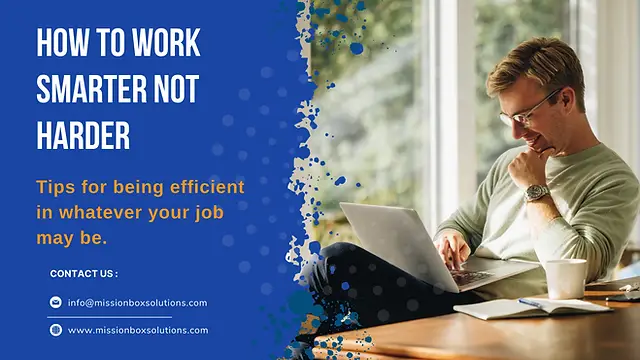In this article, I will talk briefly about the concept of working smarter, not harder. By adopting a frugal lifestyle, we can learn how to maximize our resources and make more efficient use of our time and energy. This article will provide insights and tips on how to prioritize tasks, delegate effectively, and leverage technology to work smarter and achieve greater productivity.
Work Smarter, Not Harder
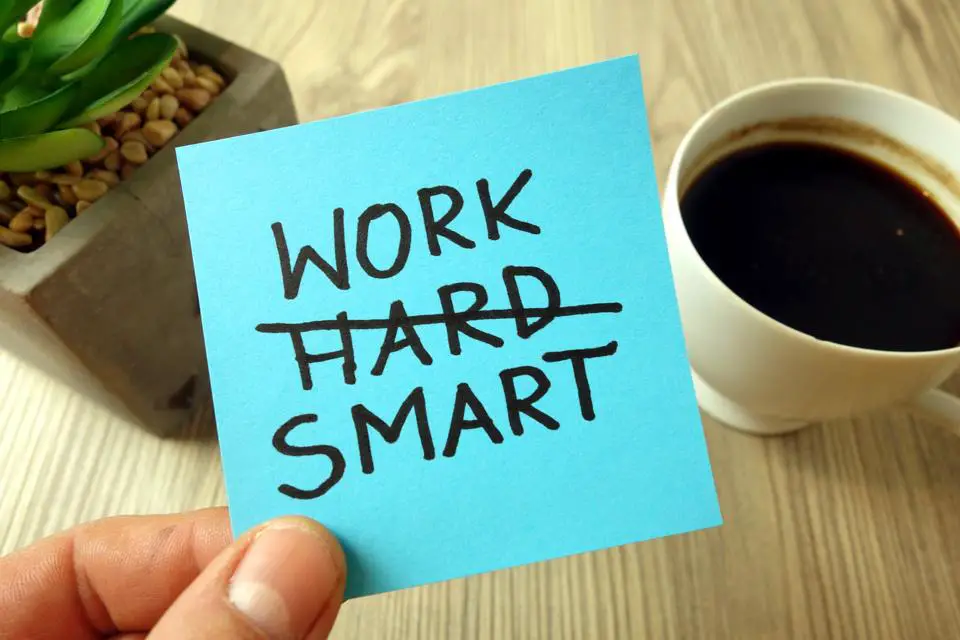
Introduction
In today’s fast-paced world, the phrase “work smarter, not harder” has become increasingly popular. But what does it really mean? Working smarter involves maximizing efficiency, balancing work and personal life, and utilizing strategies and technologies that help increase productivity and reduce stress levels. In this article, I will explore the importance of working smarter, identify strategies to achieve it, and discuss the long-term impact it can have on our overall well-being and success.
Understanding the Concept
Working smarter means finding ways to achieve more with less effort. It’s about finding efficient ways to accomplish tasks and focusing on what really matters. By prioritizing our efforts and utilizing available resources effectively, we can streamline our workflow and achieve better results in less time.
Maximizing Efficiency
To work smarter, we need to maximize efficiency in everything we do. This involves identifying and eliminating unnecessary tasks or processes, automating repetitive tasks, and finding ways to streamline workflows. By doing so, we can save valuable time and energy, allowing us to focus on more important and impactful work.
Balancing Work and Personal Life
Working smarter also means finding a balance between work and personal life. It’s about recognizing that overworking and neglecting our personal well-being can actually hinder our productivity and overall success. By setting boundaries, taking regular vacations and breaks, and engaging in hobbies and relaxation, we can recharge and maintain a healthy work-life balance.
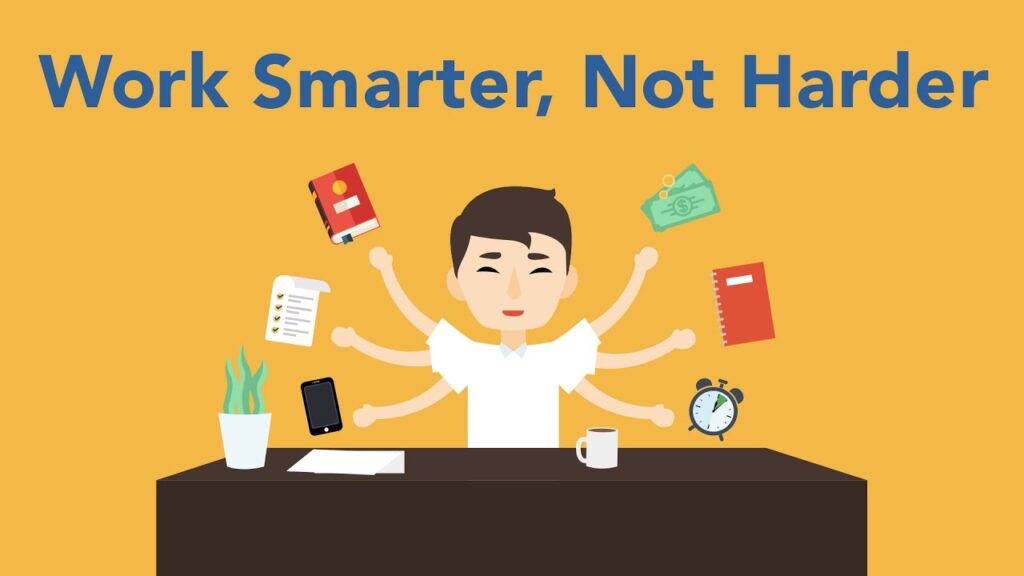
Why is it Important to Work Smarter?
Increased Productivity
One of the key benefits of working smarter is increased productivity. By focusing on the most important tasks and eliminating distractions, we can accomplish more in less time. This not only allows us to achieve our goals more efficiently but also gives us a sense of accomplishment and fulfillment.
Reduced Stress Levels
Working smarter can significantly reduce stress levels. By prioritizing tasks, utilizing time-saving tools, and avoiding multitasking, we can minimize the feeling of being overwhelmed. This leads to improved mental well-being and a better overall quality of life.
Improved Overall Well-being
When we work smarter, we take care of our personal well-being and create a positive work environment. By setting clear goals, practicing effective communication, and nurturing supportive networks and collaborations, we cultivate a sense of purpose and satisfaction in our work. This, in turn, contributes to our overall well-being and happiness.
Identifying Work-Smarter Strategies
To work smarter, it’s crucial to identify and implement strategies that can help us be more efficient and effective in our work. Here are some strategies to consider:
Setting Clear Goals
Setting clear goals is essential to working smarter. By knowing exactly what we want to achieve, we can prioritize tasks and stay focused on the most important ones. Goals also provide a sense of direction and motivate us to stay committed and dedicated to our work.
Prioritizing Tasks
Prioritization is key to working smarter. By categorizing tasks based on their urgency and importance, we can allocate our time and resources more effectively. This helps us avoid getting overwhelmed and ensures that important tasks are completed in a timely manner.
Eliminating Distractions
In today’s digital age, distractions can easily derail our focus and productivity. To work smarter, it’s important to eliminate or minimize distractions as much as possible. This may involve turning off notifications, creating a dedicated workspace, or using productivity apps that block distracting websites or apps.
Delegating Responsibilities
Delegating responsibilities is a crucial aspect of working smarter. By recognizing our strengths and weaknesses, we can assign tasks to others who are better suited for them. This frees up our time to focus on tasks that require our expertise, ultimately leading to better overall results.
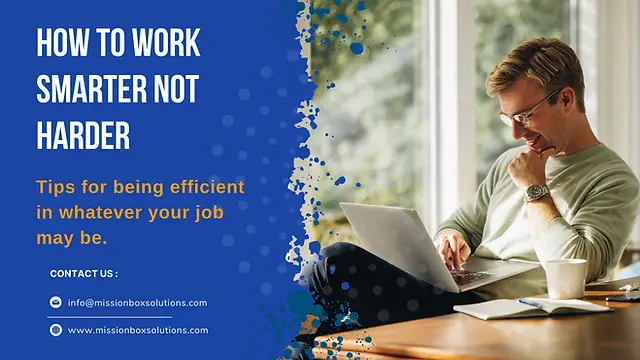
Improving Time Management
Effective time management is essential for working smarter. By managing our time well, we can accomplish more in less time and avoid unnecessary stress and overwhelm. Here are some strategies to improve time management:
Creating a Schedule
Creating a schedule helps us stay organized and structure our day effectively. By allocating specific blocks of time for different tasks or activities, we can ensure that each task receives the attention it needs. It’s important to be realistic about our time estimates and allow for breaks and downtime.
Utilizing Time-Saving Tools
In today’s digital world, there are countless time-saving tools available that can help us work smarter. From project management software to automation tools, these technologies can streamline our workflows and reduce manual and repetitive tasks. It’s important to explore and utilize the tools that best fit our needs and preferences.
Avoiding Multitasking
Contrary to popular belief, multitasking often hinders productivity. To work smarter, it’s important to focus on one task at a time and give it our full attention. This allows us to work more efficiently and produce higher-quality results.
Taking Regular Breaks
Taking regular breaks is crucial for maintaining productivity and preventing burnout. Research has shown that short breaks throughout the day can actually improve focus and concentration. It’s important to listen to our bodies and minds and take breaks when needed, preferably engaging in activities that help us relax and recharge.
Developing Effective Communication Skills
Effective communication is a key aspect of working smarter. By improving our communication skills, we can avoid misunderstandings, collaborate more effectively, and reduce wasted time and effort. Here are some strategies to enhance our communication skills:
Active Listening
Active listening is essential for effective communication. By fully engaging in conversations and really understanding what others are saying, we can avoid miscommunication and ensure that our responses are well-informed and appropriate. Active listening also demonstrates respect and fosters positive relationships.
Clear and Concise Messaging
To work smarter, it’s important to communicate in a clear and concise manner. By using simple language, avoiding unnecessary details, and organizing our thoughts before communicating, we can relay information more effectively and avoid confusion or misunderstandings.
Utilizing Technology for Efficient Communication
Technology plays a crucial role in communication today. By utilizing communication tools such as email, instant messaging, and video conferencing, we can communicate efficiently and effectively with colleagues, clients, and partners. It’s important to leverage these tools to minimize time spent on unnecessary meetings or lengthy email exchanges.
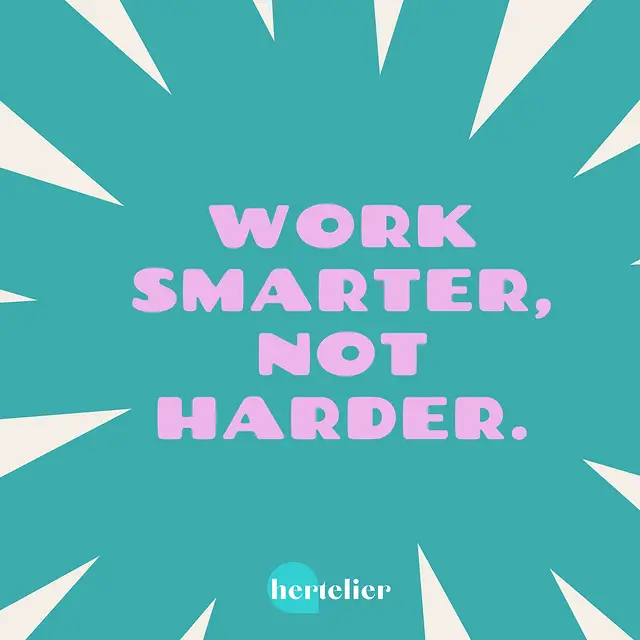
Adopting a Growth Mindset
Adopting a growth mindset is essential for working smarter. A growth mindset is the belief that our abilities and intelligence can be developed through effort, practice, and continuous learning. By embracing challenges, seeking opportunities for growth, and overcoming obstacles and setbacks, we can constantly improve ourselves and achieve greater success.
Embracing Challenges
Working smarter involves embracing challenges rather than avoiding them. By facing challenges head-on and viewing them as opportunities for growth and learning, we can expand our skills and knowledge, ultimately leading to better performance and outcomes.
Seeking Continuous Learning
To work smarter, it’s important to continuously seek opportunities for learning and growth. This can involve attending seminars or workshops, reading books or articles, or taking online courses. By investing in our personal and professional development, we can acquire new skills and knowledge that will enhance our effectiveness and efficiency.
Overcoming Obstacles and Setbacks
Obstacles and setbacks are inevitable in any endeavor. Working smarter involves developing resilience and the ability to bounce back from setbacks. By learning from failures, adjusting our strategies, and persevering in the face of challenges, we can achieve long-term success.
Building Strong Networks and Collaborations
Building strong networks and collaborations is another important aspect of working smarter. By connecting with like-minded individuals and forming mutually beneficial relationships, we can access valuable resources, share knowledge, and leverage collective expertise. Here are some ways to build strong networks and collaborations:
Networking Opportunities
Attending industry events, joining professional organizations, and participating in online communities provide ample networking opportunities. By actively engaging with others and nurturing relationships, we can build a strong professional network that can support and enhance our work.
Collaborative Projects
Collaborating on projects with colleagues or partners can lead to innovative solutions and better outcomes. Working together allows us to combine our strengths and leverage each other’s expertise, leading to improved efficiency and productivity.
Knowledge Sharing
Sharing knowledge with others is a powerful way to work smarter. By being open and generous with our insights and experiences, we not only help others grow but also gain fresh perspectives and valuable feedback. Online platforms, such as blogs or social media, provide opportunities to share knowledge with a wider audience.

Utilizing Technology for Productivity
Technology has revolutionized the way we work and has numerous tools and solutions to help us work smarter. By utilizing these technologies, we can automate tasks, collaborate more effectively, and improve overall productivity. Here are some examples of technology for productivity:
Automation Tools
Automation tools can help streamline repetitive tasks and reduce manual effort. From email automation to data entry automation, these tools can save valuable time and allow us to focus on more important and strategic work.
Project Management Software
Project management software can help us organize and track tasks, deadlines, and resources more effectively. These tools provide a centralized platform for collaboration, allowing teams to work together seamlessly and stay on top of project progress.
Cloud Storage Solutions
Cloud storage solutions provide secure and accessible storage for our files and documents. By storing our work in the cloud, we can easily access and share files from anywhere, collaborate remotely, and avoid the hassles of traditional physical storage.
Implementing Effective Work-Life Balance Strategies
Achieving work-life balance is vital for working smarter. By taking care of our personal well-being and nurturing a fulfilling personal life, we can perform better in our professional endeavors. Here are some strategies for implementing effective work-life balance:
Setting Boundaries
Setting boundaries is crucial for maintaining work-life balance. By clearly defining when work starts and ends, and establishing guidelines for after-work hours and weekends, we can create separation between our work and personal life. It’s important to communicate these boundaries with colleagues and clients to ensure understanding and respect.
Taking Regular Vacations and Breaks
Taking regular vacations and breaks is essential for recharging and rejuvenating. By disconnecting from work and engaging in activities that bring us joy and relaxation, we can prevent burnout and maintain a healthy work-life balance. It’s important to plan and prioritize vacations and breaks to ensure they are taken regularly.
Engaging in Hobbies and Relaxation
Engaging in hobbies and activities outside of work is an important aspect of work-life balance. By pursuing activities that bring us joy and help us unwind, we can maintain a sense of fulfillment and happiness outside of work. It’s important to prioritize these activities and make time for them regularly.
Nurturing a Positive Work Environment
Creating a positive work environment is essential for working smarter. By fostering collaboration, recognizing achievements, and providing growth opportunities, we can enhance our productivity and overall well-being. Here are some ways to nurture a positive work environment:
Recognizing and Celebrating Achievements
Recognizing and celebrating achievements is crucial for boosting morale and motivation. Whether it’s a small win or a major accomplishment, acknowledging and appreciating the efforts and contributions of individuals or teams goes a long way in creating a positive work environment.
Promoting Collaboration and Teamwork
Promoting collaboration and teamwork cultivates a supportive work environment. By encouraging open communication, sharing knowledge, and fostering a sense of camaraderie, we can enhance productivity and create a space where everyone feels valued and heard.
Providing Growth Opportunities
Providing growth opportunities is important for motivating and retaining talented individuals. By offering training programs, mentorship opportunities, or chances to work on challenging assignments, we can help individuals develop their skills and expertise, ultimately benefiting both the individual and the organization.
Being Mindful of Personal Well-being
Taking care of personal well-being is crucial for working smarter. When we prioritize our physical, mental, and emotional well-being, we are better equipped to handle challenges and perform at our best. Here are some ways to be mindful of personal well-being:
Maintaining Physical Health
Maintaining physical health is important for sustaining energy and focus. Regular exercise, a balanced diet, and sufficient sleep are essential for overall well-being. By prioritizing our physical health, we can increase our productivity and overall happiness.
Practicing Stress Management Techniques
Stress can hinder our ability to work smarter. Practicing stress management techniques, such as mindfulness meditation, deep breathing exercises, or journaling, can help us manage stress and improve our overall well-being. It’s important to find techniques that work for us and make them a regular part of our routine.
Taking Care of Mental and Emotional Well-being
Taking care of our mental and emotional well-being is vital for working smarter. This may involve seeking support from a therapist or counselor, practicing self-care activities that bring joy and relaxation, or developing strategies to manage negative emotions. By prioritizing our mental and emotional well-being, we can approach our work with a clear and focused mind.
Strategies for Overcoming Procrastination
Procrastination is a common challenge that hinders productivity and efficiency. By implementing strategies to overcome procrastination, we can work smarter and accomplish tasks more effectively. Here are some strategies to overcome procrastination:
Breaking Tasks into Smaller Steps
Breaking tasks into smaller, more manageable steps makes them less overwhelming. By tackling each step systematically, we can make progress and build momentum, ultimately leading to task completion.
Setting Deadlines and Milestones
Setting deadlines and milestones provides a sense of urgency and accountability. By breaking down larger tasks into smaller deadlines or milestones, we can ensure that progress is made consistently and that tasks are completed within a reasonable timeframe.
Seeking Motivation Techniques
Finding motivation techniques that work for us is essential for overcoming procrastination. This may involve setting rewards for completing tasks, creating a conducive work environment, or finding inspiration from motivational quotes or videos. It’s important to experiment with different techniques and identify what resonates with us personally.
Learning from Successful Individuals
Learning from successful individuals can provide valuable insights and inspiration for working smarter. By studying the habits and strategies of successful people, we can gain valuable knowledge and apply it to our own work. Here are some ways to learn from successful individuals:
Studying Successful People’s Habits
Studying the habits of successful individuals can reveal patterns and strategies that contribute to their success. By reading biographies, interviews, or books written by successful people, we can gain insights into their mindset, work ethic, and strategies for achieving their goals.
Seeking Mentorship
Mentorship is a powerful way to learn from someone who has already achieved what we aspire to. By seeking mentorship from experienced individuals in our field, we can benefit from their guidance, advice, and expertise. Mentors can provide valuable insights and help us navigate our career paths more effectively.
Emulating Effective Strategies
Identifying effective strategies used by successful individuals and emulating them can help us work smarter. Whether it’s time management techniques, communication strategies, or problem-solving approaches, we can apply these strategies to our own work and adapt them to suit our unique circumstances.
Conclusion
Working smarter, not harder, is a mindset and approach that can significantly impact our productivity, well-being, and overall success. By understanding the concept, implementing strategies such as goal-setting, time management, effective communication, and work-life balance, and continuously striving for improvement, we can achieve more with less effort. The benefits of working smarter include increased productivity, reduced stress levels, improved overall well-being, and long-term success. So let’s embrace the idea of working smarter, not harder, and unlock our full potential.

